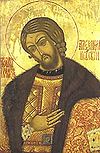- Nikolay Saltykov
-
Count Nikolay Ivanovich Saltykov (Russian: Николай Иванович Салтыков, 31 October 1736 – 28 May 1816), a member of the Saltykov royal family, was a Russian Field Marshal and imperial courtier.
He was the head of the Russian Army as the president of the War Collegium 1791–1802. He was also the Lieutenant Grand Master of the Order of Malta from 1801 - 1803. He was also the tutor of the eventual Tsar Paul I of Russia and his two sons, Konstantin Pavlovich Romanov, and Tsar Alexander I of Russia.
Life
His parents were general Ivan Alexeivitch Saltykov (who was himself the nephew of Anna I of Russia) and countess Anastasia Petrovna Tolstoy. He spent a short time in the Semënovskij Regiment, of which he became a permanent member in 1748. In 1747, he and his father took part in the Russian advance to the River Rhine. During the Seven Years' War he distinguished himself in several battles against Prussian forces. After the victory at Kunersdorf over Frederick II of Prussia, Nikolay was sent to Saint Petersburg to deliver news of the victory to the commander in chief - for that service, he was made a colonel.
In 1761, under the command of Pyotr Rumyantsev, he fought at Kolberg. Peter II of Russia made Saltykov a major general and in 1763 he was given command of the troops stationed in Poland, where he took part in the Russo-Turkish War (1768–1774). In 1769 he aided Prince Alexander Golitsyn in the siege and occupation of the city of Chotyn, which Russian troops entered on 10 September that year. For fighting with distinction in these battles he was made a lieutenant-general and a member of the Order of Alexander Nevsky, but due to ill health he was forced to leave the campaign in order to travel abroad in search of a cure. During this time, he spent three years visiting Europe, most notably visiting Berlin and Paris. After he returned to Russia, Catherine II of Russia made him vice-president of Russia's Military Council. Simultaneously, Catherine made him 'Hofmeister' of the court. He became tutor to Grand Duke Paul, with whom he again visited Berlin in 1776 before accompanying Paul on a grand tour across Europe in 1781 and 1782.
On 24 November 1782 Catherine made Saltykov a member of the Order of Saint Andrew, a senator and a member of the high court council. In the following years Catherine made Saltykov permanent tutor to her grandsons Alexander (the future Alexander I of Russia) and Constantine. In 1790, during the celebrations of the peace with Sweden, Saltykov was made a Count of the Russian Empire and granted 5,000 serfs in Russian Poland and an annual pension of 125 rubles. On Paul's accession to the throne, Saltykov was made field marshal general on 8 November 1796 and then President of the Military Council of State. Alexander I, during the celebrations of his coronation, gave Saltykov his portrait decorated with diamonds.
At the start of the Napoleonic Wars, Saltykov was instructed to look after military reports and to be head of state while Alexander was away leading the Russian army in 1813 and 1814. On Alexander's return to Saint Petersburg, Saltykov was promoted to Prince of the Russian Empire, with the title of Excellency. He was also made Lieutenant Grand Master of the Order of Malta from 1801 to 1803 on behalf of Alexander, who had been elected Grand Master but could not carry out his official duties.
References
Preceded by
Paul I of Russia
de factoGrand Master of the Knights Hospitaller
1801–1803
Lieutenant de factoSucceeded by
Giovanni Battista TommasiPreceded by
Nikolay Petrovich RumyantsevChairman of the Committee of Ministers
1812 — 1816Succeeded by
Pyotr Vasilyevich LopukhinPeople from Russia Leaders and religious - Pre-1168
- 1168–1917
- 1922–1991
- 1991–present
- RSFSR leaders
- General secretaries
- Soviet premiers (1st deputies)
- Soviet heads of state (and their spouses)
- Prime ministers (1st deputies)
- Foreign ministers
- Prosecutors general
- Metropolitans and patriarchs
- Saints

Military and explorers - Field marshals
- Soviet marshals
- Admirals
- Aviators
- Cosmonauts
Scientists and inventors - Aerospace engineers
- Astronomers and astrophysicists
- Biologists
- Chemists
- Earth scientists
- Electrical engineers
- IT developers
- Linguists and philologists
- Mathematicians
- Naval engineers
- Physicians and psychologists
- Physicists
- Weaponry makers
Artists and writers Sportspeople - Chess players
Categories:- 1736 births
- Field Marshals of Russia
- Knights of Malta
- Russian commanders of the Napoleonic Wars
- Members of the State Council of the Russian Empire
- Recipients of the Order of the White Eagle (Poland)
- Recipients of the Order of St. Andrew
- Lieutenants of the Knights Hospitaller
- Russian military personnel stubs
- Russian nobility stubs
Wikimedia Foundation. 2010.

